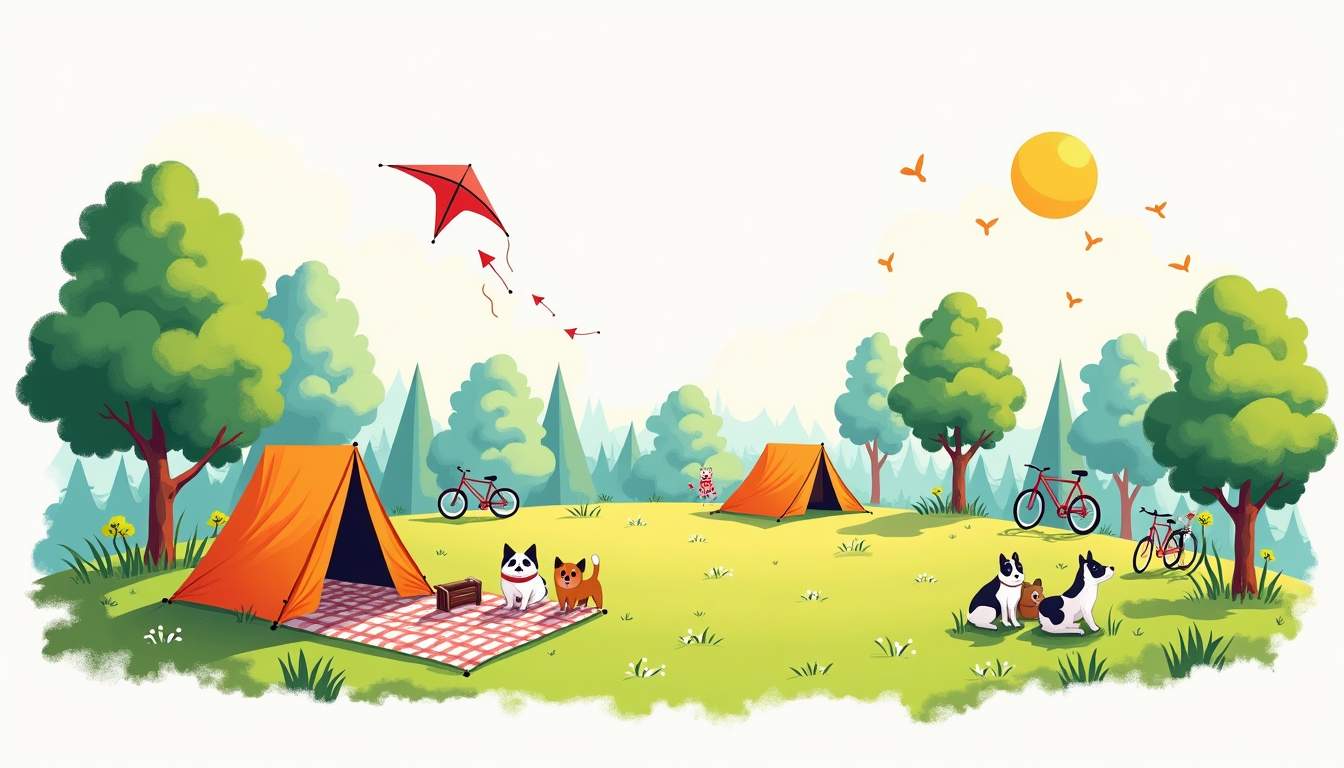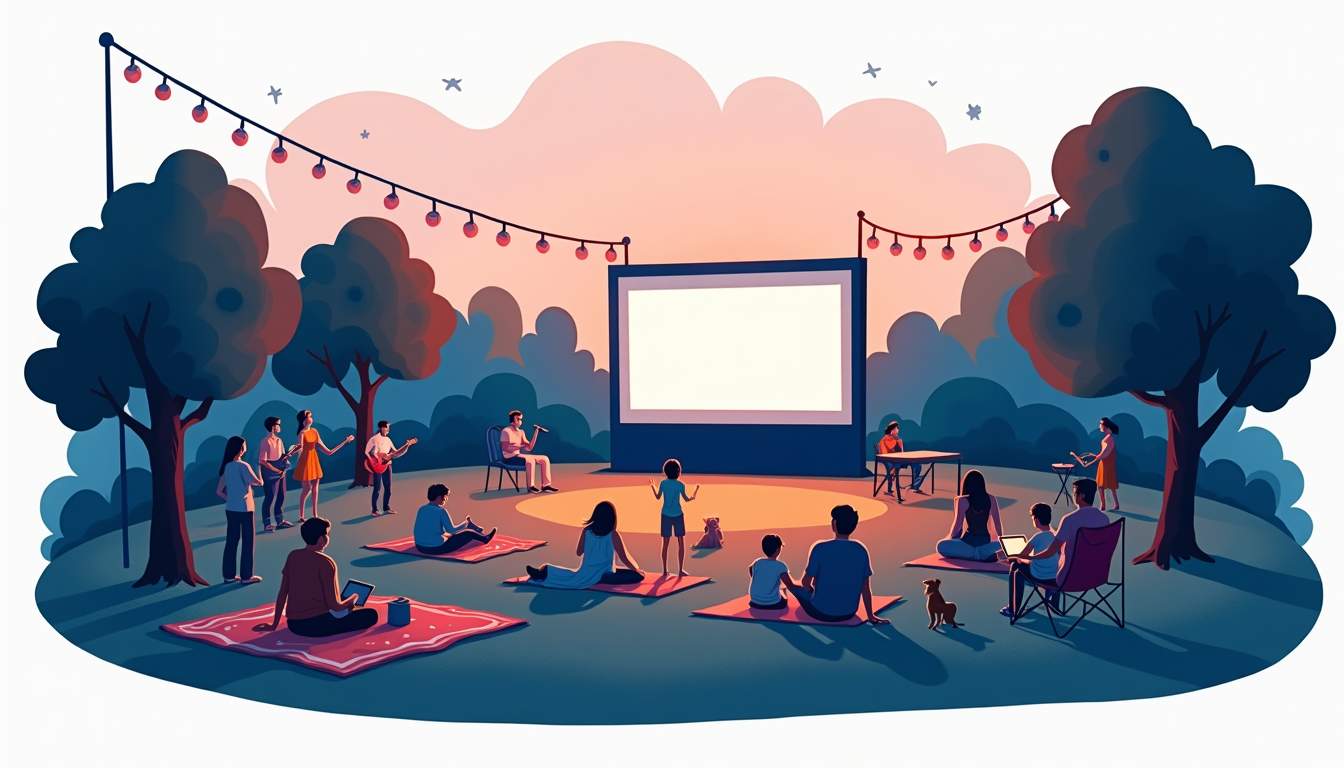
Finding meaningful outdoor activities that appeal to all ages can be one of the best parts of living in a community. From seasonal festivals to weekly meetups, the right event can turn a routine weekend into a memorable family day. The list below highlights a variety of community-driven outdoor events that blend recreation, education, and neighborhood spirit.
Farmers' markets are more than simply places to buy fresh produce; they are community hubs where families can sample local foods, meet growers, and enjoy live music. Many markets incorporate educational booths, kids' activities, and occasional craft vendors, making them ideal for a short morning outing that teaches children about local agriculture and food sources.
Harvest fairs add a seasonal twist with pumpkin patches, corn mazes, hayrides, and contests that celebrate the fall harvest. These events often include interactive demonstrations — such as jam-making or beekeeping — that encourage curiosity and hands-on learning for curious kids and adults alike.
Beyond the typical offerings, many farmers' markets now feature specialty sections showcasing heirloom varieties and organic produce, giving visitors a chance to explore rare fruits and vegetables they might not find in supermarkets. Seasonal cooking demonstrations often highlight recipes that use market-fresh ingredients, inspiring families to bring new flavors into their home kitchens. Additionally, some markets partner with local artists, providing spaces where families can appreciate handcrafted wares and learn about traditional crafts.
At harvest fairs, children can often engage with farm animals in petting zoos, providing close-up experiences that help nurture empathy and understanding about animal care. Interactive workshops may also include lessons on sustainable farming practices or seed saving, making these gatherings rich educational opportunities wrapped in festive entertainment. Many fairs feature culinary contests or tasting events where visitors can sample artisanal cheeses, honey, and baked goods, celebrating the region's bounty in delicious ways.
Bring reusable bags, a small cooler for perishables, and comfortable shoes. Plan to arrive early for better parking and fresher selections, and check market calendars for special family-oriented programming like story hours or cooking demos.
Guided nature walks led by park rangers, naturalists, or local volunteers are an excellent way for families to explore nearby trails safely. These walks often feature age-appropriate themes — such as birding, wildflower identification, or nocturnal wildlife — and can transform a routine hike into a rich, educational experience.

Many cities and towns host seasonal programs tailored to families, including stroller-friendly routes and shorter loops for younger children. Accessibility-minded options make it possible for multi-generational groups to enjoy the outdoors together.
A daypack with water, sunscreen, and binoculars can make a big difference. Dressing in layers helps accommodate shifting weather, and a small field guide or an app for plant and bird identification turns discoveries into teachable moments.
Summer evenings often bring outdoor movie screenings and concerts to community parks. These events are typically free or low-cost, creating low-pressure social settings where families can relax on blankets and enjoy performances or family-friendly films under the stars.

Food trucks or concession stands frequently complement the entertainment, allowing families to sample different cuisines without the need to cook. Local musicians often perform before the main event, providing an informal way for children to experience live music and local artistry.
Bring bug spray and layered clothing to stay comfortable as temperatures drop. A portable flashlight or glow sticks help kids navigate park pathways safely after dark, and arriving early ensures a good spot for larger groups.
Volunteer-driven park cleanups and community conservation days are practical ways for families to give back to the places they enjoy. These events often include kid-friendly stations with tasks tailored to different ages and abilities, such as picking up litter, planting native species, or constructing simple wildlife habitats.
Participating in conservation events helps instill environmental stewardship in children and provides a sense of accomplishment. Many community groups combine cleanup efforts with educational workshops on recycling, composting, or native gardening techniques.
Check local parks and recreation websites for event schedules and supplies. Gloves, sturdy shoes, and closed-toe footwear are usually recommended. Some organizations provide tools and snacks, while others suggest that volunteers bring reusable water bottles and sun protection.
Community-led fitness classes in parks — such as yoga, tai chi, boot camps, or family Zumba — offer active, social experiences suitable for different fitness levels. These classes often run on a drop-in basis and are a great way for parents and kids to exercise together without the pressure of formal competition.
For families that enjoy sports, many communities sponsor youth and parent-child leagues for soccer, baseball, and ultimate frisbee. Adaptive leagues and inclusive programs ensure that children of varying abilities can participate and enjoy team camaraderie.
Research age requirements and skill level expectations ahead of time. Some parks offer trial sessions or open play days where families can sample the activity before committing to a season.
Community gardens offer hands-on opportunities for families to learn about growing food, soil health, and seasonal rhythms. Many gardens welcome families to volunteer plots, host seed swaps, and provide workshops on topics like composting, companion planting, and container gardening.
Urban farming initiatives can also include kids’ clubs or school partnerships that integrate gardening with science and nutrition education, helping children understand where food comes from and encouraging healthier eating habits.
Membership or volunteer sign-up usually involves a small fee or time commitment. Families can start with a container garden or adopt a small plot to get comfortable with planting and maintenance routines.
Story walks combine literacy and nature by placing pages of a children’s book along a trail, encouraging families to read aloud as they walk. These installations are often found at parks, libraries, and nature centers and change periodically to feature new titles and themes.

Outdoor learning trails add interpretive signs, tactile features, and interactive exhibits that make natural concepts accessible to young learners. Topics can range from geology and waterways to insect life cycles and native plant gardens.
Story walks promote reading fluency, listening skills, and physical activity simultaneously. Learning trails create multi-sensory experiences that support different learning styles and encourage curiosity about the natural world.
Seasonal festivals and cultural events bring neighbors together to celebrate local heritage, holidays, and traditions. Family-oriented programming often includes parades, craft stations, dance performances, and kid-centered competitions, offering a rich mix of entertainment and cultural education.
Many festivals partner with local schools, artists, and food vendors to create inclusive experiences that showcase the diversity of a community. These events foster belonging and create the kind of shared memories that strengthen neighborhood ties.
Check event schedules for kid-specific attractions and quieter times if sensory sensitivity is a concern. Carry a small first-aid kit and a charged phone, and set meeting points in case anyone wanders off in busy crowds.
Organized bike rides, parades, and family fun runs provide active ways to explore community streets and greenways. These events often close certain routes to traffic, making them safer for children and strollers, and they typically include rest stops, games, and water stations.
Fun runs and bike parades can be themed — superhero costumes, decorated bikes, or a historical walk — adding an imaginative element that attracts all ages. Many events emphasize accessibility and offer short-course options for younger participants.
Ensure helmets and reflective gear are used for bike rides, and pick a pace appropriate for younger children. Carry snacks and water, and review route maps beforehand to identify bathrooms and shade areas.
Outdoor arts events, like sidewalk chalk festivals and plein air painting workshops, invite families to express creativity in public spaces. These gatherings are usually open to all ages and often feature local artists who give demonstrations or lead short classes.
Art-focused events can be calming and inclusive; they let children experiment with large-scale projects and various materials while interacting with neighbors in a constructive, visually engaging way.
Bring washable clothes and a tarp or mat for supplies. Many events supply chalk or paints, but families might prefer to bring favorite tools to personalize their creations.
Local parks and recreation departments, library calendars, neighborhood associations, and community centers are reliable sources for upcoming outdoor family events. Social media groups and community bulletin boards also highlight volunteer opportunities and pop-up activities that may not be widely advertised.
Joining a mailing list or volunteer roster for one or two recurring events each year can help families stay connected and discover new favorites. Participating as volunteers or vendors provides deeper involvement and often comes with perks like early access or behind-the-scenes experiences.
Weather plans, accessibility needs, and age-appropriate expectations make any outing more enjoyable. Prioritize events that balance fun with learning, and encourage children to try something new. Regular participation in community outdoor events strengthens family bonds and helps build a resilient, active neighborhood.
Embrace the spirit of outdoor living and community connection at Tennessee National. Nestled in Tennessee’s natural beauty, our luxury gated community offers more than just a home—it’s a lifestyle filled with outdoor activities, scenic trails, and exclusive family-friendly events. From our Greg Norman Signature Golf Course to waterfront dining and vibrant social clubs, there’s something for every member of your family to enjoy. Ready to explore all that Tennessee National has to offer? Schedule a private tour today and start creating unforgettable memories in a community designed for active families like yours.